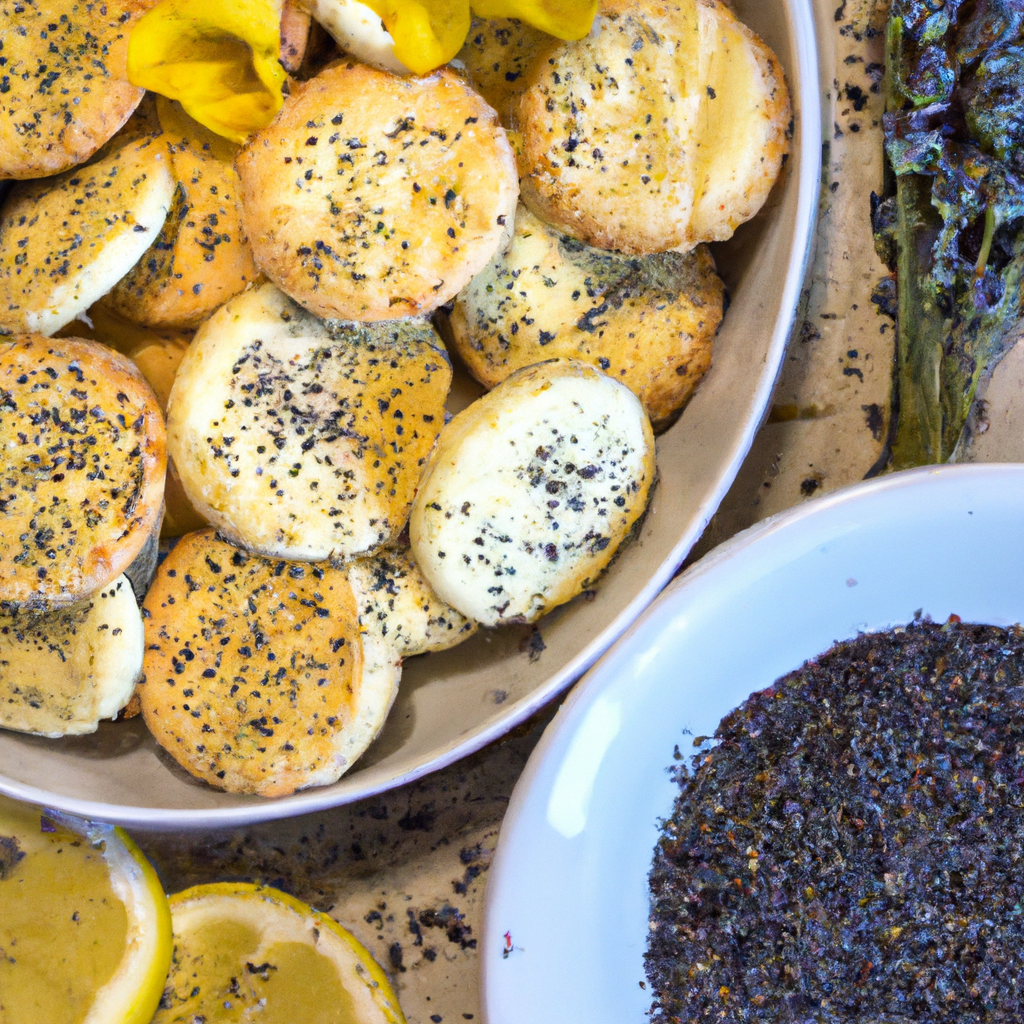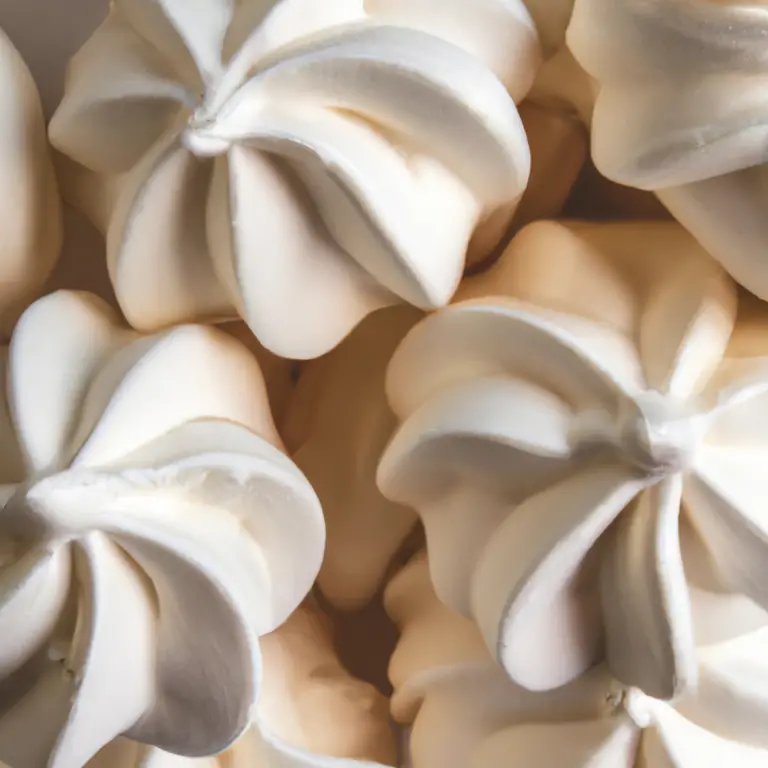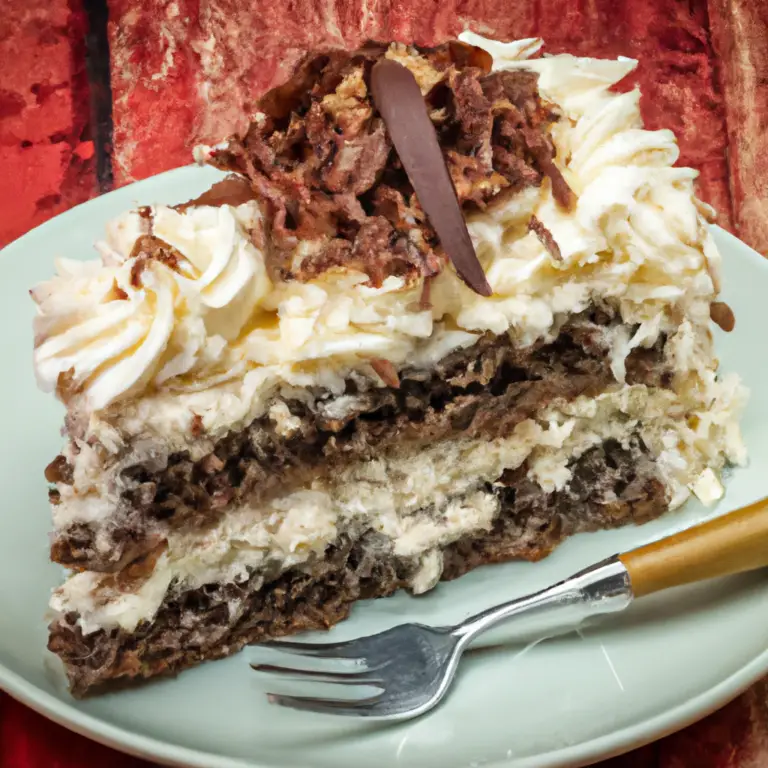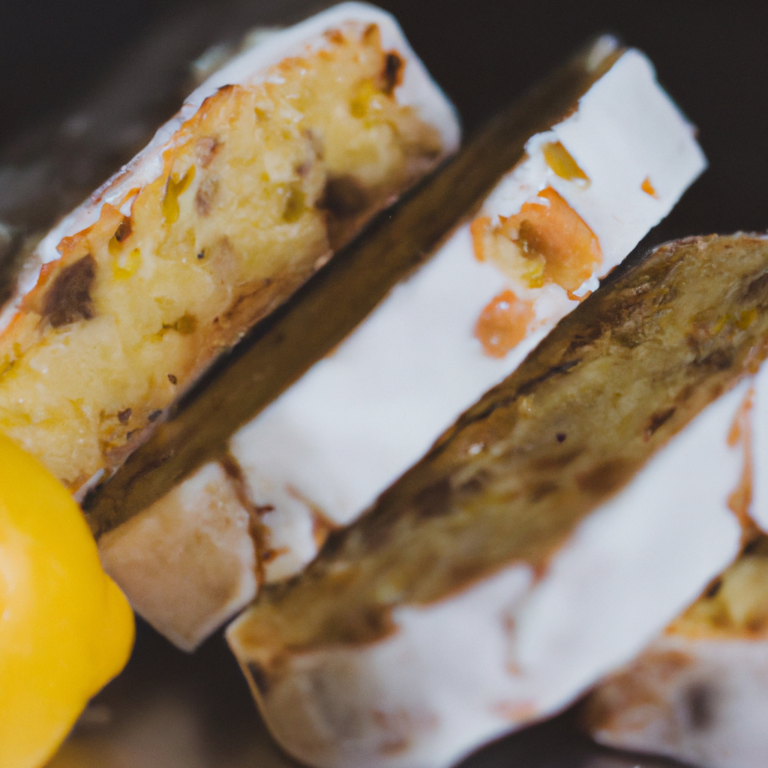Lemon, Lavender, and Poppy Seed Cookies
Get ready to indulge in the delightful combination of lemon, lavender, and poppy seed with these irresistible cookies.
You’ll be transported to a world of bliss as you savor the tangy citrus notes blended with the subtle floral aroma and a slight crunch from the poppy seeds.
This easy-to-follow recipe will guide you through the process of creating these delectable treats in no time.
So, put on your apron and get ready to impress your taste buds with these heavenly cookies.
Origins
To grasp the origins of these delightful cookies, let’s delve into the history of their key ingredients.
The first ingredient we’ll explore is the lemon. Lemons have been cultivated for thousands of years and are believed to have originated in Southeast Asia. They were introduced to Europe by Arab traders during the Middle Ages. The tangy and refreshing flavor of lemons adds a zesty twist to these cookies.
Next, we’ve lavender, which has a long history dating back to ancient Egypt and Greece. Lavender was popularized in baking during the Victorian era and is known for its soothing aroma and subtle floral taste.
Finally, we’ve the poppy seed, which has been used in culinary traditions around the world for centuries. These tiny seeds provide a delightful crunch and a nutty flavor to the cookies.
Understanding the origins of these key ingredients helps us appreciate the rich history and flavors of these lemon, lavender, and poppy seed cookies.
Ingredients for Lemon, Lavender, and Poppy Seed Cookies
- All-purpose flour: 2 1/4 cups
- Baking powder: 1/2 teaspoon
- Salt: 1/4 teaspoon
- Unsalted butter, softened: 3/4 cup (1 1/2 sticks)
- Granulated sugar: 1 cup
- Large egg: 1
- Lemon zest: From 1 large lemon
- Fresh lemon juice: 2 tablespoons
- Dried culinary lavender: 1 tablespoon (crushed or finely chopped if the buds are large)
- Poppy seeds: 1 tablespoon
- Vanilla extract: 1 teaspoon
For the Lemon Glaze (optional):
- Powdered sugar: 1 cup
- Fresh lemon juice: 2 to 3 tablespoons (adjust for desired consistency)
- Lemon zest: 1 teaspoon (optional, for extra lemon flavor)
Instructions:
-
Preheat your oven to 350°F (175°C) and line baking sheets with parchment paper.
-
In a medium bowl, whisk together the flour, baking powder, and salt. Set aside.
-
In a large bowl, cream together the softened butter and granulated sugar until light and fluffy.
-
Beat in the egg, followed by the lemon zest, lemon juice, and vanilla extract.
-
Gradually add the dry ingredients to the wet ingredients, mixing until just combined.
-
Fold in the crushed lavender and poppy seeds.
-
Drop dough by rounded teaspoons onto the prepared baking sheets, leaving some space between each cookie.
-
Bake for 10-12 minutes, or until the edges are lightly golden.
-
Allow the cookies to cool on the baking sheet for a few minutes before transferring them to a wire rack to cool completely.
If you choose to make the glaze:
-
Whisk together powdered sugar and lemon juice until smooth. Add more lemon juice or powdered sugar as needed to achieve a drizzling consistency.
-
Drizzle the glaze over the cooled cookies and sprinkle with lemon zest if desired.
-
Let the glaze set before serving.
Tips for Cooking
Enhance your baking skills with these helpful tips for cooking lemon, lavender, and poppy seed cookies. These tips will ensure that your cookies turn out perfectly every time.
| Tip | Description |
|---|---|
| 1. | Use fresh ingredients for the best flavor. The zest of a fresh lemon will add a vibrant citrus taste to your cookies. |
| 2. | Cream the butter and sugar together until light and fluffy. This step will create a tender and soft texture in your cookies. |
| 3. | Avoid overmixing the dough. Overmixing can result in tough cookies. Mix until just combined to maintain a delicate texture. |
| 4. | Chill the dough before baking. This will prevent the cookies from spreading too much and help them keep their shape. |
| 5. | Sprinkle some extra poppy seeds on top of the cookies before baking for an added crunch and visual appeal. |
Final Thoughts
To summarize, keep these key takeaways in mind to perfect your lemon, lavender, and poppy seed cookies.
-
Use fresh ingredients to enhance the flavors. The zesty lemon and fragrant lavender should be at their peak to create a delightful taste experience.
-
Remember to chill the cookie dough before baking. This step allows the flavors to meld together and results in a more tender and chewy texture.
-
Be mindful of the baking time and temperature. Overbaking can lead to dry and brittle cookies, while underbaking can result in a raw center.
-
Don’t skimp on the poppy seeds! They add a unique crunch and visual appeal to the cookies.
Enjoy the process and savor every bite of these delightful treats.
Frequently Asked Questions
Can I Substitute the Lemon Zest With Lemon Juice in This Recipe?
Yes, you can substitute the lemon zest with lemon juice in this recipe. The lemon juice will provide a tangy flavor to the cookies, similar to the zest. Remember to adjust the amount accordingly.
How Long Will These Cookies Stay Fresh if Stored in an Airtight Container?
If you store these cookies in an airtight container, they will remain fresh for approximately 3-4 days. Remember to seal the container tightly to preserve their flavor and texture. Enjoy!
Can I Freeze the Cookie Dough for Later Use?
Yes, it is possible to freeze the cookie dough for later use. Freezing the dough allows you to enjoy freshly baked cookies whenever you desire. It is important to store it correctly in an airtight container or freezer bag to maintain its quality.
Can I Use Dried Lavender Instead of Fresh Lavender in This Recipe?
Yes, you can substitute dried lavender for fresh lavender in this recipe. The taste may vary slightly, but it will still be suitable. Just remember to adjust the quantity as needed.
Can I Replace the All-Purpose Flour With Gluten-Free Flour for a Gluten-Free Version of These Cookies?
Yes, you can use gluten-free flour as a substitute for all-purpose flour in these cookies. This substitution is a straightforward way to create a gluten-free version, making it possible for individuals with gluten sensitivities to savor these treats.






